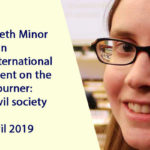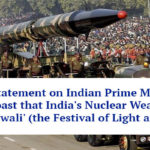Statement of NGO Representatives and Experts to the 2019 NPT Prep Com for the 2020 Review Conference, United Nations, New York
May 1, 2019
Since the NPT was signed 50 years ago, the United States and Russia have engaged in nuclear arms control negotiations and concluded strategic arms control and reduction treaties that have lowered tensions, reduced excess nuclear stockpiles, increased predictability and transparency, and helped to reduce the nuclear danger.
While the size of the U.S. and Russian nuclear stockpiles has been significantly reduced from their Cold War peaks, the dangers posed by the still excessive U.S. and Russian nuclear arsenals and launch-under-attack postures, are still exceedingly high.
Today, each side can launch as many as 800 thermonuclear weapons in a first strike within about 20 minutes of the “go” order from either president. Each side would have hundreds more nuclear weapons available in reserve for further counterstrikes. The result would be a global catastrophe.
As then-presidents Ronald Reagan and Mikhail Gorbachev noted in their 1985 summit statement: “A nuclear war cannot be won and must never be fought.”
Further progress on nuclear disarmament – or in the very least active negotiations to that end – by the United States and Russia is at the core of their NPT Article VI obligation to “pursue negotiations in good faith on effective measures relating to cessation of the nuclear arms race at an early date and to nuclear disarmament, and on a treaty on general and complete disarmament under strict and effective international control.”
Disarmament leadership from the United States and Russia, which possess the vast majority of the world’s nuclear firepower, is also critical to the essential task of engaging the world’s other nuclear-armed states in the global enterprise to achieve a world without nuclear weapons.
As we approach the NPT’s 2020 Review Conference, it is the considered view of a wide range of nongovernmental experts and organizations that the world’s two largest nuclear-armed states need to:
· engage in serious talks to facilitate the extension of New START by five years, as allowed for in Article XIV of the Treaty;
· reach an agreement that prevents new deployment of destabilizing ground-based, intermediate-range missiles; and
· resume regular, high-level talks on strategic stability to reduce the risk of miscalculation.
Failure by the U.S. and Russian leadership to take these steps would represent a violation of their NPT Article VI obligations and would threaten the very underpinnings of the NPT regime.
Unfortunately, relations between Washington and Moscow are at their lowest point since the mid-1980s, and their dialogue on nuclear arms control has been stalled since Russia rejected a 2013 offer from President Obama to negotiate further nuclear cuts beyond the modest reductions mandated by the 2010 New Strategic Arms Reduction Treaty.
Worse still, the two sides have not resumed their strategic stability talks since the last session was held in Helsinki in late-2017, and the future of two of the most important nuclear arms control agreements – the INF Treaty and New START – are in grave doubt.
The INF Treaty
Barring a diplomatic miracle, the two sides are now on course to terminate the landmark 1987 Intermediate-Range Nuclear Forces (INF) Treaty on August 2. The collapse of the INF Treaty opens the door to a new and even more dangerous forms of missile competition.
Russia may deploy more of its 9M729 ground-launched cruise missiles, which the United States and NATO have determined are treaty noncompliant, and Russia has threatened to convert a sea-based cruise missile system for ground-launch. For its part, the Trump administration has begun developing new, “more usable” low-yield nuclear warheads for use on D-5 submarine-launched strategic missiles, and the administration has announced that it will begin testing – before the end of this year – new ground-launched, intermediate-range cruise missiles, which have been prohibited by the INF Treaty. Ukraine, a party to the INF Treaty, has suggested it might pursue INF missile development.
Whether nuclear-armed or conventionally-armed, ground-launched, intermediate-range missile systems are destabilizing because of their very short time-to-target capabilities afford little or no warning of attack.
Instead of a mindless pursuit of such INF missile deployments, this conference must strongly encourage the INF states parties to refrain from deploying intermediate-range, ground-launched missiles and urge Moscow and Washington to engage in talks designed to produce a new INF-missile control arrangement.
For example, NATO could declare, as a bloc, that no alliance members will field any currently INF Treaty-prohibited missiles in Europe so long as Russia does not deploy treaty-prohibited systems where they could hit NATO territory. This would require Russia to move at least some currently deployed 9M729 missiles.
The U.S.. and Russian presidents could agree to this “no-first INF missile deployment plan” through an executive agreement that would be verified through national technical means of intelligence. Russia could be offered additional confidence-building measures to ensure that the United States would not place offensive missiles in the Mk. 41 missile-interceptor launchers now deployed Europe as part of the Aegis Ashore system.
New START
Meanwhile, the START agreement, which verifiably caps each side’s strategic deployed arsenals to no more than 1,550 warheads and 700 strategic delivery systems, will expire in February 2021 unless extended or replaced.
Without a positive decision to extend New START, there would be no legally binding limits on the world’s two largest nuclear superpowers for the first time since 1972. The risk of unconstrained U.S.-Russian nuclear competition, and even more fraught relations, would grow.
In a March 2018 interview with NBC, President Putin voiced interest in an extension of New START or even possibly further cuts in warhead numbers. In April 2018, the Trump administration announced it is pursuing a “whole-of-government review” about whether to extend the New START. In 2017, shortly before he became the U.S. National Security Advisor, John Bolton publicly called on President Trump to terminate New START.
New START clearly serves U.S. and Russian security interests. The treaty imposes important bounds on the strategic nuclear competition between the two nuclear superpowers.
Failure to extend New START, on the other hand, would compromise each side’s understanding of the others’ nuclear forces, open the door to unconstrained nuclear competition, and undermine international security.
Fortunately, the treaty can be extended by up to five years (to 2026) by a simple agreement by the two presidents—without complex negotiations and without further approval from the U.S. Senate or Russian Duma.
An agreement to extend New START requires the immediate start of consultations on key issues of concern to both sides.
Russia has raised concerns about the verification of the conversion of some U.S. nuclear weapons delivery systems to conventional roles. The United States, for its part, has understandably suggested that new Russian strategic nuclear weapons systems, including the Status-6 nuclear-armed, long-range, torpedo and the proposed nuclear-propelled, long-range cruise missile, should be accounted for under New START.
If both sides are willing to engage in a professional dialogue relatively soon, these issues can be addressed in a mutually agreed manner either before or soon after a decision to extend New START is taken.
New START extension would also provide additional time for Trump, or his successor, to pursue negotiations on more far-reaching nuclear cuts involving strategic and tactical nuclear systems, an understanding about the limits of U.S. strategic missile defenses, and limitations on non-nuclear strategic strike weapons that both sides are beginning to develop..
A Core Issue for NPT 2020
These issues must be central issues for this preparatory conference and all NPT States Parties before the 2020 Review Conference.
Some delegations claim that before progress on nuclear disarmament can be achieved, the right environment must be established. Such arguments amount to magical thinking about how progress on disarmament has been and can be achieved.
Such arguments are designed to distract from a disappointing lack of political will to engage in a common-sense nuclear risk reduction dialogue.
In reality, the current environment demands the resumption of a productive, professional dialogue between representatives of the White House and the Kremlin on nuclear arms control and disarmament.
The urgency of these problems also demands that all NPT states parties, as part of their own solemn legal responsibilities to uphold the NPT and advance their Article VI goals:
· press Presidents Trump and Putin to relaunch the dialogue on strategic stability;
· pledge to reach early agreement to extend the New START agreement;
· and refrain from pursuing deployments of INF-prohibited missile systems in the European theater (or elsewhere) that produce a dangerous action-reaction cycle.
We strongly urge each delegation to emphasize these priority steps to ensure key states remain in compliance with the NPT and sustain progress toward the attainment of all of the treaty’s core goals and objectives.
Endorsed by:
Alexey Arbatov, member of the Russian Academy of Sciences (academician), head of the Center for International Security, ?.?. Primakov Institute for World Economy and International Relations, Russian Academy of Sciences, Member of Parliament (State Duma) in 1993-2003 and former deputy chair of the Defense Committee, member of the Soviet START I delegation
Joseph Cirincione, President, Ploughshares Fund
Lisa Clark and Reiner Braun, Co-Presidents, International Peace Bureau
Thomas Countryman, former acting U.S. Undersecretary of State for Arms Control and International Security and Chair of the Board of the Arms Control Association
Sergio Duarte, President of the Pugwash Conferences on Science and Global Affairs, former UN high representative for disarmament, President of the 2005 NPT Review Conference, and a member of Brazil’s delegation to the Eighteen-Nation Disarmament Committee negotiations on the NPT
Dr. Joseph Gerson, President and CEO, Campaign for Peace Disarmament and Common Security
John Hallam, People for Nuclear Disarmament Human Survival Project, and Co-Convener, Abolition 2000 Nuclear Risk Reduction Working Group
Angela Kane, Senior Fellow, Vienna Center for Disarmament and Non-Proliferation, former United Nations Under-Secretary-General and High Representative for Disarmament
Daryl G. Kimball, Executive Director, Arms Control Association*
Dr. Catherine M. Kelleher, former Deputy Assistant Secretary of State for Russia, Ukraine and Eurasia, and the Secretary of Defense’s representative to NATO
Michael Krepon, Co-founder, The Stimson Center
Richard G. Lugar, United States Senator (Ret.), President, The Lugar Center
Dr. Victor Mizin, Institute of World Economy and International Relations of the Russian Academy of Science, former Soviet/Russian diplomat
Prof. Götz Neuneck, Chair German Pugwash and Council Member Pugwash Conferences on Science and World Affairs
Ali Nouri, President, Federation of American Scientists
Guy C. Quinlan, President, Lawyers Committee on Nuclear Policy
Dr. William C. Potter, Director, James Martin Center for Nonproliferation Studies and Sam Nunn and Richard Lugar, Professor of Nonproliferation Studies, Middlebury Institute of International Studies at Monterey
Greg Thielmann, former Director of the Office of Strategic, Proliferation, and Military Affairs in the State Department’s Bureau of Intelligence and Research
Hiromichi Umebayashi, Founder & Special Advisor, Peace Depot Inc. Japan
*Statement coordinator
____________________
Daryl G. Kimball,
Executive Director
Arms Control Association
1200 18th St. NW, Suite 1175,
Washington, DC 20036
202-463-8270 x107
202-277-3478 (mobile)
@DarylGKimball and @armscontrolnow
Recipient of the MacArthur Award for Creative and Effective Institutions


